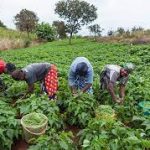AfDB Approves $66m Grant To Expand Electricity Grid In Guinea
African News, Latest Headlines, News Around Africa, West Africa Friday, July 15th, 2022
(AFRICAN EXAMINER) – African Development Bank (AfDB) has approved a $66.39 million support package for Guinea to enable the West African nation increase access to electricity.
The funding package consists of a $4.17 million grant and a $9.37 million loan from the African Development Fund, the concessional arm of the AfDB and a $24.13 million grant and a $28.72 million loan from the Transition Support Facility.
The project is co-financed by the French Development Agency, the Islamic Development Bank, the Sustainable Energy Fund for Africa, hosted by the Bank, USAID, through the Africa Energy Programme, and the Guinean government.
Some 797 medium-voltage lines linking 40 localities in the country will be built, as well as 47 kilometres of mixed lines, 984 kilometres of low-voltage lines, 21 high-voltage and low-voltage substations and 128 H61 substations (transformers whose power varies between 50 and 160 kVA). The project will also provide 37,367 household connection kits.
The project will cover the major cities and surrounding localities of Kankan, Kérouané and Siguiri in the region of Haute-Guinée, and Nzérékoré, Beyla and Lola in Guinée Forestière. These regions are among the localities where access to electricity is relatively low in comparison with the rest of the country. They have a population of around 1.2 million (52.1 percent women).
In addition, there will be about 100,000 direct beneficiaries of the project (including 72,112 new subscribers) composed of individual households, women’s associations, health centers, schools and businesses.
The AfDB’s Country Manager for Guinea, Léandre Bassolé said the Guinea Power Access Improvement Project will improve people’s living conditions and the productivity of beneficiary companies through access to regular, reliable and cheaper energy services.
“In addition to the deployment of electricity infrastructure, the project will support reform initiatives in the electricity subsector and capacity building for its stakeholders. It will also promote the productive use of electricity by providing women’s groups with equipment to increase their productivity.
“Lastly, public lighting will increase security and give women more time in which to conduct their commercial activities and schoolchildren opportunities to improve their academic performance”, he said.
Over the past decade, the Bank has tripled its net commitments to Guinea. Its current portfolio comprises 21 operations totaling around $625 million. Emphasis is placed on energy and transport infrastructure (65.7 percent), aimed at strengthening regional integration.
The remaining investments cover mining (15.9 percent), governance (6.7 percent), agriculture (4.2 percent), the environment (3 percent), the social sector (2.6 percent) and finance (1.9 percent).
The AfDB bases its country strategy for Guinea on two priority areas: improving access to electricity and developing agro-industrial value chains.
Similarly, the Bank has approved a €63 million loan to Kenya to significantly boost cereals and oil seeds production by over 1.5 million metric tonnes over the next two years. The production increase will help bolster national food security and economic resilience.
The loan is part of the AfDB’s $1.5 billion African Emergency Food Production Facility, an Africa-wide initiative to avert a looming food crisis exacerbated by the war in Ukraine.
It will support the country’s Ministry of Agriculture, Livestock, Fisheries and Cooperatives (MoALFC). It will enable the government to promptly provide affordable fertilizer and seeds to farmers ahead of the October-December 2022 short rains and into the 2022/2023 long rains crop production season.
The project entails the delivery of certified seeds, fertilizers and agricultural extension to 650,000 farmers to boost productivity. An e-voucher system will be used to ensure that subsidies for inputs are “smart”.
Another component of the project will provide trade finance guarantees and leverage the private sector to ensure sufficient volumes of fertilizer are available to farmers. In addition to boosting staple food availability, the project, which targets smallholder farmers, is expected to particularly benefit women and youth.
AfDB’s Vice President for Agriculture, Human and Social Development Dr. Beth Dunford said: “We are pleased to present the Kenya African Emergency Food Production Facility. Successful implementation of the Facility will see some 650,000 farmer direct beneficiaries, resulting in the production of 1.5 million tonnes of cereals and oil seeds. In all, the Facility will positively impact some 2.8 million people”.
In his remarks, Cabinet Secretary for the MoALFC, Peter Munya said the government is looking into ways and means of addressing the cost of ‘unga’ (maize flour) to bring it down so that consumers can afford it.
The agriculture sector remains the backbone of the Kenyan economy, employing 70% of the rural population and accounting for about 65% of export earnings, although its share in the GDP has declined over the recent past.
Still, Kenya and other countries in East Africa and the Horn of Africa, have been hit hard by not only the inflationary effects of the war in Ukraine, but also locust swarms and climate- and drought-related impacts.
The number of food-insecure people in the country’s pastoral and marginal areas rose by 48 percent between August 2021 and February 2022, according to estimates.
These overlapping shocks, together with the Covid-19 pandemic-have set back Kenya’s progress towards achieving the sustainable development goals.
Related Posts
Short URL: https://www.africanexaminer.com/?p=78799






















